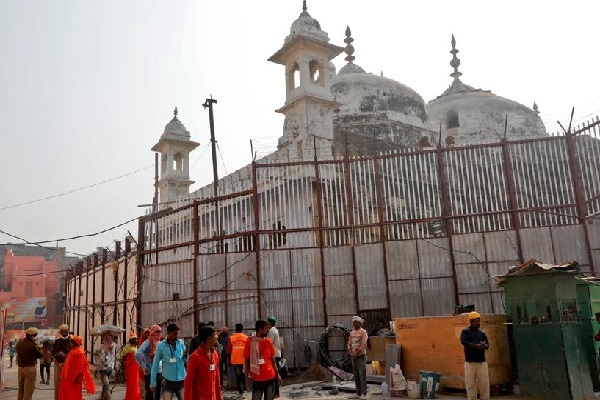Gatherings at Gyanvapi Mosque Limited by Indian Court

Caretakers of the mosque say they will knock on the doors of the country's top court, arguing the surveyors have found part of the fountain in the wuzu (ablution) area which is being called by Hindus a shivling (a symbol of the Hindu lord Shiva) to grab the mosque site.
The judge at the court in Varanasi –– Hinduism's holiest city and the site of the historic mosque –– ruled on Monday that Islamic gatherings should be limited to 20 people, lawyer H S Jain said.
The court ordered the survey of the mosque after five Hindu women –– represented by Jain –– sought permission to perform Hindu rituals in one part of it, claiming a Hindu temple once stood on the site.
The Muslim body taking care of the mosque said it would challenge the order in the Supreme Court, adding the object being described as a shivling was part of the fountain in the wuzu (ablution) area, Indian Express newspaper reported.
"In all old mosques, there used to be a hauz (basin), and a fountain in the centre. This is part of the fountain, which they are calling shivling. We are surprised how the court passed the order in a hurry," S M Yasin of the Anjuman Intezamia Masjid Committee, said.
"To convert the mosque into a temple, then it is nothing but an attempt at a conspiracy to give birth to communal hatred. This is against the historical facts, and against the law," said a statement by the All India Muslim Personal Law Board, a non-governmental institution that oversees the application of Muslim personal law in the country.
Muslims not prepared to lose 'another mosque'
The Gyanvapi Mosque, located in the political constituency of Prime Minister Narendra Modi, is one of the three large mosques in northern Uttar Pradesh state that Hindu hardliners allege –– in common with some other religious sites –– was built on top of demolished Hindu temples.
Hardline Hindu groups tied to Modi's far-right Bharatiya Janata Party or BJP have stepped up demands to excavate inside some mosques and to permit searches in the Taj Mahal mausoleum.
Uttar Pradesh deputy chief minister Keshav Prasad Maurya, a BJP member, told Reuters local TV partner ANI that the government welcomed the court order "and we will implement it".
Leaders of India's 200 million Muslims view such moves as part of their religious persecution in the Hindus-dominated country.
Lawmaker Asaduddin Owaisi said Muslims are not prepared to lose "another mosque" after Babri Masjid –– an iconic 16th-Century mosque that was demolished by Hindu zealots in 1992 and where the country’s top court allowed Hindus to build a temple in 2019.
The 1992 incident led to religious riots that killed nearly 2,000 people, mostly Muslims, across India.
Muslims under harsh Modi rule
Since Modi came to power in 2014, Hindu mobs have lynched scores of people — mainly Muslims and Dalit Hindus — suspected of illegally transporting cows or consuming beef.
Hindu far-right groups have also targeted Muslims over "love jihad", the conspiracy theory that Muslims are luring Hindu women with the aim of conversion and eventually national domination.
Muslims were also accused of spreading Covid-19. In recent years, Hindu mobs have targeted Muslims praying on Fridays in northern India.
BJP recently banned wearing the hijab in classrooms in Karnataka state. Hardline Hindu groups later demanded such restrictions in more Indian states. Muslim mutton sellers and fruit vendors have also become the target of the far-right Hindu groups.
During a Hindu festival earlier in April, Hindu mobs pelted stones on mosques in several areas while DJs played loud music outside the mosques as worshippers prayed.
Hindu monks known for their incendiary anti-Muslim rhetoric have been calling for Rohingya-type ethnic cleansing of Indian Muslims.
Source: TRT World
 Most Commented
Most Commented 


